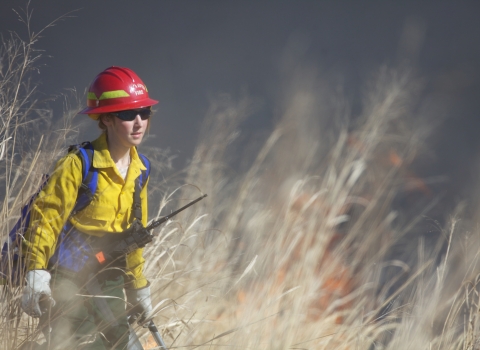The U.S. Fish and Wildlife Service (Service), joined by a number of partners, officially signed a treaty designating the City of Albuquerque as an Urban Bird Treaty City on Saturday, August 6, 2016. The treaty signing event recognized the migratory bird conservation and education accomplishments to date in Albuquerque under a two-year Urban Bird Treaty grant, and celebrated the renewed commitment of partners to continue work in Albuquerque for migratory birds beyond the grant. The Urban Bird Treaty program is a unique collaborative effort between the Service and cities, bringing together private citizens, Federal, State, and municipal agencies and non-governmental organizations.
“Migratory bird conservation is not only good for the birds, but also for the people living in and visiting Albuquerque,” said Dr. Benjamin Tuggle, Southwest Regional Director for the U.S. Fish and Wildlife Service. “Any actions we take to improve habitat and keep our city safe for birds will also help keep our urban communities vibrant and strong.”
The treaty signing ceremony took place during the Summer Wings event at the Rio Grande Nature Center. This family-friendly event included photo opportunities with an educational turkey vulture and a great horned owl and the release of rescued hummingbirds and falcons by a local wildlife rehabilitation organization. The event recognized the efforts of partners and community members whose support has been vital to realizing migratory bird conservation and education achievements.
The Albuquerque Urban Bird Treaty grant has been extremely successful. Since the $100,000 grant was awarded by the Service two years ago, partners have organized 560 events, with nearly 18,000 attendees. In addition, more than 18,000 volunteer hours have been logged and nearly $20,000 in matching funds have been generated.
“We attribute this success to the unique structure of our partnership, which used the collaborative efforts of four active partners working with local, state, and federal agencies,” said Greg Hughes, Southwest Region Migratory Bird Chief for the U.S Fish and Wildlife Service.
“We are confident this has been one of the most successful Urban Bird Treaty City grants in the history of the program.”
Launched in 1999, the Urban Conservation Treaty for Migratory Birds (Urban Bird Treaty) program was created to help municipal governments conserve birds that live and nest or overwinter or migrate through their cities. The Urban Bird Treaty program has an emphasis on education and outreach programs, and includes resources for constructing schoolyard habitat sites, creating backyard habitats, and resources for educating citizens about birds and their conservation in an urban environment. Because birds are widely considered indicators of the health of our environment, it is a good way to engage people in better understanding their environment and inspire action to keep it healthy and safe for birds and for people.
To learn more about this initiative, visit https://www.fws.gov/birds/grants/urban-bird-treaty/urban-bird- treaty-albuquerque.php
The mission of the U.S. Fish and Wildlife Service is working with others to conserve, protect,
and enhance fish, wildlife, plants, and their habitats for the continuing benefit of the American
people. We are both a leader and trusted partner in fish and wildlife conservation, known for
our scientific excellence, stewardship of lands and natural resources, dedicated professionals,
and commitment to public service.
For more information on our work and the people who make it happen, visit www.fws.gov.
Connect with our Facebook page at www.facebook.com/usfws, follow our tweets at
www.twitter.com/usfwshq, watch our YouTube Channel at http://www.youtube.com/usfws and
download photos from our Flickr page at http://www.flickr.com/photos/usfwshq.
- http://www.southwest.fws.gov -


